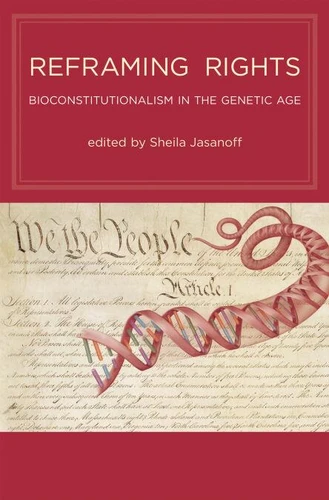Reframing Rights. Bioconstitutionalism in the Genetic Age
Par :Formats :
Disponible dans votre compte client Decitre ou Furet du Nord dès validation de votre commande. Le format ePub protégé est :
- Compatible avec une lecture sur My Vivlio (smartphone, tablette, ordinateur)
- Compatible avec une lecture sur liseuses Vivlio
- Pour les liseuses autres que Vivlio, vous devez utiliser le logiciel Adobe Digital Edition. Non compatible avec la lecture sur les liseuses Kindle, Remarkable et Sony
- Non compatible avec un achat hors France métropolitaine
 , qui est-ce ?
, qui est-ce ?Notre partenaire de plateforme de lecture numérique où vous retrouverez l'ensemble de vos ebooks gratuitement
Pour en savoir plus sur nos ebooks, consultez notre aide en ligne ici
- Nombre de pages320
- FormatePub
- ISBN978-0-262-29778-3
- EAN9780262297783
- Date de parution22/07/2011
- Protection num.Adobe DRM
- Taille945 Ko
- Infos supplémentairesepub
- ÉditeurThe MIT Press
Résumé
Investigations into the interplay of biological and legal conceptions of life, from government policies on cloning to DNA profiling by law enforcement. Legal texts have been with us since the dawn of human history. Beginning in 1953, life too became textual. The discovery of the structure of DNA made it possible to represent the basic matter of life with permutations and combinations of four letters of the alphabet, A, T, C, and G.
Since then, the biological and legal conceptions of life have been in constant, mutually constitutive interplay-the former focusing on life's definition, the latter on life's entitlements. Reframing Rights argues that this period of transformative change in law and the life sciences should be considered "bioconstitutional."Reframing Rights explores the evolving relationship of biology, biotechnology, and law through a series of national and cross-national case studies.
Sheila Jasanoff maps out the conceptual territory in a substantive editorial introduction, after which the contributors offer "snapshots" of developments at the frontiers of biotechnology and the law. Chapters examine such topics as national cloning and xenotransplant policies; the politics of stem cell research in Britain, Germany, and Italy; DNA profiling and DNA databases in criminal law; clinical trials in India and the United States; the GM crop controversy in Britain; and precautionary policymaking in the European Union.
These cases demonstrate changes of constitutional significance in the relations among human bodies, selves, science, and the state.
Since then, the biological and legal conceptions of life have been in constant, mutually constitutive interplay-the former focusing on life's definition, the latter on life's entitlements. Reframing Rights argues that this period of transformative change in law and the life sciences should be considered "bioconstitutional."Reframing Rights explores the evolving relationship of biology, biotechnology, and law through a series of national and cross-national case studies.
Sheila Jasanoff maps out the conceptual territory in a substantive editorial introduction, after which the contributors offer "snapshots" of developments at the frontiers of biotechnology and the law. Chapters examine such topics as national cloning and xenotransplant policies; the politics of stem cell research in Britain, Germany, and Italy; DNA profiling and DNA databases in criminal law; clinical trials in India and the United States; the GM crop controversy in Britain; and precautionary policymaking in the European Union.
These cases demonstrate changes of constitutional significance in the relations among human bodies, selves, science, and the state.
Investigations into the interplay of biological and legal conceptions of life, from government policies on cloning to DNA profiling by law enforcement. Legal texts have been with us since the dawn of human history. Beginning in 1953, life too became textual. The discovery of the structure of DNA made it possible to represent the basic matter of life with permutations and combinations of four letters of the alphabet, A, T, C, and G.
Since then, the biological and legal conceptions of life have been in constant, mutually constitutive interplay-the former focusing on life's definition, the latter on life's entitlements. Reframing Rights argues that this period of transformative change in law and the life sciences should be considered "bioconstitutional."Reframing Rights explores the evolving relationship of biology, biotechnology, and law through a series of national and cross-national case studies.
Sheila Jasanoff maps out the conceptual territory in a substantive editorial introduction, after which the contributors offer "snapshots" of developments at the frontiers of biotechnology and the law. Chapters examine such topics as national cloning and xenotransplant policies; the politics of stem cell research in Britain, Germany, and Italy; DNA profiling and DNA databases in criminal law; clinical trials in India and the United States; the GM crop controversy in Britain; and precautionary policymaking in the European Union.
These cases demonstrate changes of constitutional significance in the relations among human bodies, selves, science, and the state.
Since then, the biological and legal conceptions of life have been in constant, mutually constitutive interplay-the former focusing on life's definition, the latter on life's entitlements. Reframing Rights argues that this period of transformative change in law and the life sciences should be considered "bioconstitutional."Reframing Rights explores the evolving relationship of biology, biotechnology, and law through a series of national and cross-national case studies.
Sheila Jasanoff maps out the conceptual territory in a substantive editorial introduction, after which the contributors offer "snapshots" of developments at the frontiers of biotechnology and the law. Chapters examine such topics as national cloning and xenotransplant policies; the politics of stem cell research in Britain, Germany, and Italy; DNA profiling and DNA databases in criminal law; clinical trials in India and the United States; the GM crop controversy in Britain; and precautionary policymaking in the European Union.
These cases demonstrate changes of constitutional significance in the relations among human bodies, selves, science, and the state.



